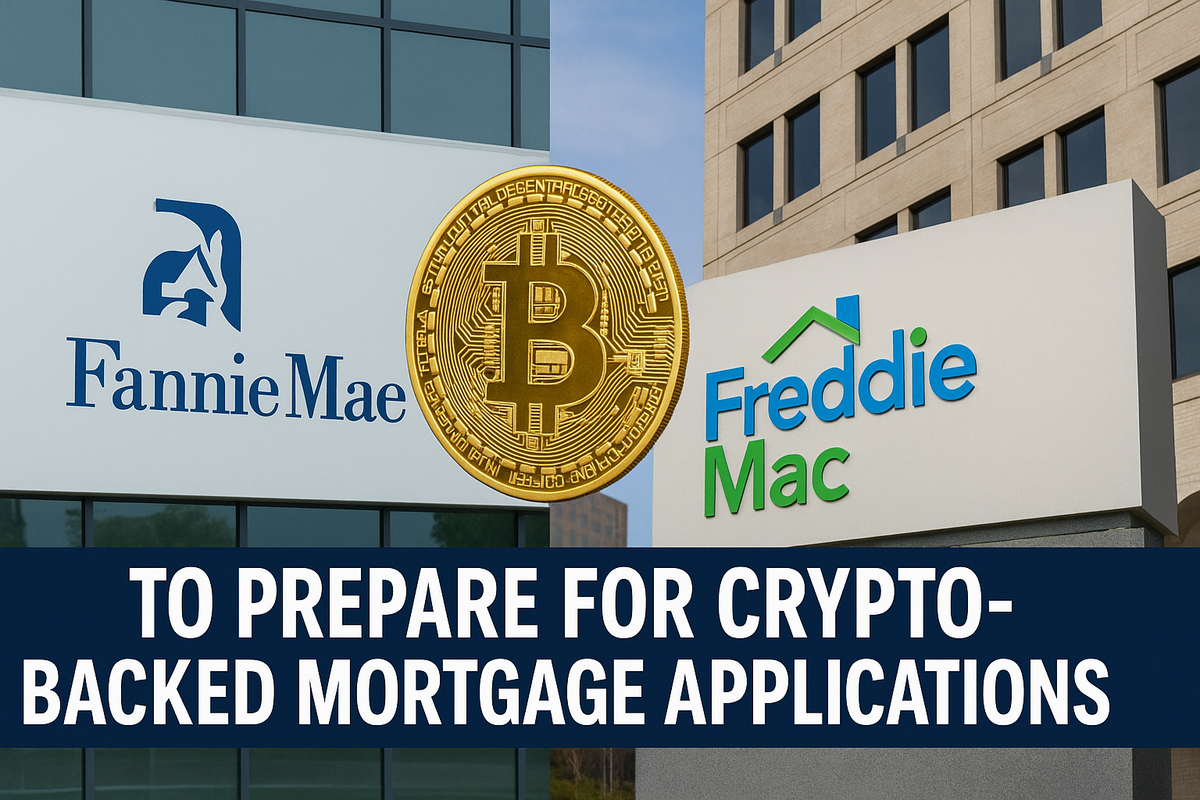By Scott Woodburn, Real Estate Knowledge Broker
June 26, 2025
In a historic move that could reshape the U.S. mortgage landscape, the Trump administration has directed Fannie Mae and Freddie Mac to begin preparing proposals that would allow cryptocurrency assets to be considered during mortgage risk assessments. The announcement, made by Federal Housing Finance Agency (FHFA) Director William J. Pulte on June 25, signals a major shift in how digital wealth may influence access to traditional real estate financing.
“In keeping with President Trump’s vision to make the United States the crypto capital of the world, today I ordered the great Fannie Mae and Freddie Mac to prepare their businesses to count cryptocurrency as an asset for a mortgage,” Pulte stated in a social media post (CNN).
What the Directive Means
The FHFA's new directive requires both government-sponsored enterprises (GSEs) to explore frameworks that would permit homebuyers to use crypto holdings—such as Bitcoin or Ethereum—as verifiable assets on their mortgage applications. Until now, borrowers needed to liquidate digital assets into U.S. dollars prior to closing, incurring capital gains taxes and often sacrificing upside potential.
Pulte clarified that only crypto assets custodied and verifiable through U.S.-regulated centralized exchanges, such as Coinbase, will be considered. In addition, Fannie Mae and Freddie Mac are expected to propose clear guidelines to address the volatility inherent in cryptocurrencies, including “risk-based adjustments” to prevent overexposure to unstable holdings (Fortune).
“For many Bitcoin holders, selling their crypto to help qualify for a mortgage means incurring massive capital gains taxes and giving up future upside,” said Adam Reeds, CEO of crypto lending firm Ledn.
This represents a clear departure from previous policy under the Biden administration, which barred the use of crypto income in mortgage qualification due to volatility concerns.
A Major Step in Trump’s Crypto Agenda
The directive aligns with President Trump’s broader push to expand the role of digital assets in American financial systems. Since returning to office, Trump has made crypto central to his second-term agenda—proposing a national Bitcoin reserve, appointing pro-crypto regulators, and scaling back enforcement actions by the SEC against digital asset firms (Bloomberg).
This change comes at a time when the president is also pushing to take Fannie Mae and Freddie Mac public, ending nearly two decades of federal conservatorship. While such a move could increase the cost of borrowing if federal guarantees are removed, it also aligns with the administration’s emphasis on private-sector innovation and deregulation.
“It signals growing institutional recognition of crypto’s role in personal and corporate balance sheets,” said Lamine Brahimi, cofounder of crypto infrastructure company Taurus.
Challenges and Considerations Ahead
While this move may expand mortgage accessibility for crypto investors, implementation details remain uncertain. Fannie and Freddie must still submit proposals to the FHFA and their respective boards before any formal changes can occur. Concerns around asset verification, valuation timing, and investor confidence still loom large.
Mortgage lenders and underwriters may also face a steeper learning curve in integrating these non-traditional assets, especially in periods of heightened market volatility. The FHFA has emphasized that any approved changes must include measures to prevent systemic risks.
“We’re seeing a modernization of mortgage standards,” wrote Pulte. “Crypto is here. It’s not a fringe asset anymore.”
What It Means for Buyers and the Market
For real estate professionals, financial advisors, and mortgage lenders, this directive opens new doors—and new responsibilities. Buyers with substantial crypto holdings may soon gain a clearer path to homeownership without needing to liquidate. For those managing complex portfolios, this could be a critical advantage, particularly as home prices remain elevated and mortgage rates stay above historical averages.
If implemented, this policy may also prompt updated risk modeling practices and appraisals that reflect the diversified wealth of next-generation buyers.
Bottom Line:
As a real estate knowledge broker, I see this as a pivotal moment—one that could fundamentally reshape how wealth is recognized and leveraged in home financing. Whether you’re a crypto investor looking to buy a home or an advisor helping clients navigate these transitions, now is the time to get ahead of the curve.
Let’s connect if you’re exploring how to integrate crypto into your real estate strategy—or need guidance preparing for what’s coming next.
Sources:
- McGrath, Catherine. Fortune, June 26, 2025
- Sheridan, Eamonn. ForexLive, June 25, 2025
- Delouya, Samantha. CNN Business, June 25, 2025
- Nishimura, Kent. Bloomberg/Getty Images, June 25, 2025

